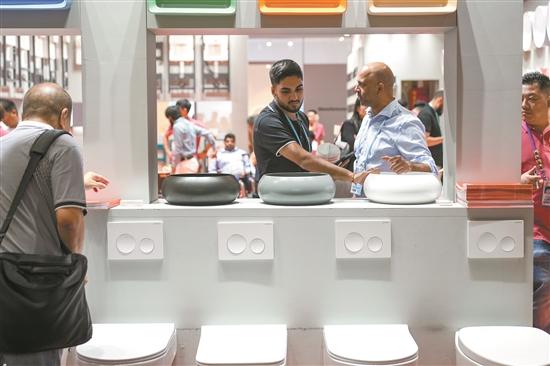

On October 23rd, the second phase of the 134th China Import and Export Fair (the "Canton Fair") was held in Guangzhou. Exhibitors and buyers remained enthusiastic, and the extensive participation of BRI countries continued to be a highlight of the exhibition.
The second phase of the Canton Fair features three professional sections of housewares, building and furniture, and gifts and decorations with the concept of integrated exhibition, attracting enterprises and merchants to gather in Pazhou. As of 5:00 p.m. on October 23rd, the cumulative number of overseas buyers attending the fair has exceeded 129,000, a significant increase compared to the same period of the previous session.
This year marks the tenth anniversary of the proposal of the Belt and Road Initiative. The Canton Fair plays an important role as a bridge in the trade coo between China and the countries participating in the Belt and Road Initiative. In the just-concluded first phase of the Canton Fair, 391 companies from BRI countries participated, attracting nearly 70,000 buyers, an increase of over 65% compared to the previous session.
The second phase of the Canton Fair continued such achievement. At the import exhibition of the second phase of this Canton Fair, a total of 110 companies from 17 BRI countries, including South Korea, Turkey, Egypt, Malaysia, and Vietnam, accounted for about 54% of the total exhibitors. They focused on showcasing characteristic products such as houseware, kitchenware, and building materials. At the same time, many buyers from BRI countries showed strong interest and enthusiasm in purchasing building materials and houseware.

Selim Cagiran from Egypt excitedly told reporters that this was his first time attending the Canton Fair as a buyer. The product he chose to buy in the second phase is window cleaning robots. "This morning, we have already reached an order of nearly 300,000 US dollars with a Chinese company. We have agreed to celebrate together tonight."
"The BRI countries are our key markets. For example, in Southeast Asia, we have established two manufacturing bases," said Ouyang Bo, Vice President of Zhejiang Haers Vacuum Containers Co., Ltd. Also, they want to develop their own brands in these emerging markets of BRI countries. Ouyang added:"We will hire local talents of the target market to develop products based on the characteristics and habits of consumers, making products closer to the local market."
The active participation of BRI countries in the Canton Fair has made many exhibitors optimistic about the potential of this emerging market and has formulated clear and long-term plans. Zhang Ping, Deputy General Manager of Hualian Co., LTD., said that Hualian has officially entered the Indonesian market with a population of nearly 280 million by cooperating with local top three enterprises in Indonesia. He said, "Our focus this year is on the Indonesian market, and next year we may turn to Russia. By cooperating with local enterprises to create a "window'", we will gradually expand the market of BRI countries."
Boonyarid Phayuhaphaisal, CEO of Korat Sangsuwan Pottery, a ceramic manufacturing company in Thailand, told reporters that compared to over a decade ago, the products showcased at the Canton Fair now are more diverse and impressive. There is also a growing trend in Thailand's local exports to China, with products like ceramic products experiencing an annual growth rate of 5% to 10%. Therefore, they hope to further explore the Chinese market through the Canton Fair.
在广交会邂逅“一带一路”新商机
10月23日,第134届中国商品进出口交易会(以下简称“广交会”)第二期在广州开展,参展商和采购商热情不减,共建“一带一路”国家的广泛参与仍是展会的一抹亮色。
广交会第二期整合打造“大家居”主题概念,吸引建材及家具、家庭用品、礼品及装饰品等板块的企业和客商齐聚琶洲。截至10月23日17时,境外采购商累计到会人数超12.9万人,比上届同期大幅增长。
今年是共建“一带一路”倡议提出十周年,广交会在中国与共建“一带一路”国家的贸易往来中发挥着重要的桥梁作用。在刚刚落幕的广交会第一期,已有来自共建“一带一路”国家的391家企业近7万名采购商参展,较上届同期增长超65%。
广交会第二期延续了这种态势。在本届广交会二期进口展上,共有来自韩国、土耳其、埃及、马来西亚、越南等17个共建“一带一路”国家的110家企业参展,占比约54%,重点展示各国家居、餐厨、建材等特色产品。同时,众多来自共建“一带一路”国家的采购商对建材、家居产品表现出浓厚的兴趣和强烈的“扫货”热情。
来自埃及的Selim Cagiran兴奋地告诉记者,本届广交会是他第一次以采购商身份参加,展会第二期他看准的产品是擦窗机器人,“今天上午我们已经与中国企业达成了一笔接近30万美元的订单,晚上双方约好一起庆祝”。
“共建‘一带一路’国家已经是我们的重点市场,比如在东南亚,我们已经布局了两个制造基地。”浙江哈尔斯真空器皿股份有限公司副总裁欧阳波表示,对于共建“一带一路”国家这些新兴市场,他们要发展自主品牌。欧阳波补充道:“我们将雇用本土化的人才,根据消费者的特征习惯来开发产品,让产品更加贴近当地市场。”
共建“一带一路”国家客商对广交会的深度参与,也让不少参展企业普遍看好这一新兴市场的潜力,制定了清晰而长远的计划。湖南华联瓷业股份有限公司副总经理张平说,华联瓷业通过与印度尼西亚当地排名前三的某家企业进行合作,正式打开了近2.8亿人口的印尼市场。他表示:“我们今年的重点是在印尼市场,明年可能会布局俄罗斯,通过与当地企业合作打造‘窗口’,一步步拓展共建‘一带一路’国家的市场。”
泰国陶瓷制造企业Korat Sangsuwan Pottery的首席执行官Boonyarid Phayuhaphaisal告诉记者,与十多年前相比,如今广交会上的产品更加丰富且令人瞩目,泰国当地对中国的出口也呈现增长趋势,像陶瓷制造类的产品每年保持在5%至10%的增长,因此想通过广交会进一步拓宽中国市场。
文|羊城晚报记者 黄婷 许张超 莫谨榕 沈钊
图|羊城晚报记者 梁喻 实习生 曾沂达
翻译|白心怡
责编 | 王瑜瑛
-
Photos|Guangzhou's popular hilltop destinations thrive with crowds on Double Ninth Festival!
2023-10-25 00:27:26 -
Over 100 BRI countries among participants in Canton Fair Phase 2
2023-10-24 00:17:19 -
Senior officials from the Gulf Cooperation Council gather in Guangzhou to seek cooperation
2023-10-24 00:23:08 -
Cultural Feast: big food heritage fair celebrates Chongyang Festival in Guangzhou
2023-10-24 00:10:58






